1. Feed wild alligators (in some places)
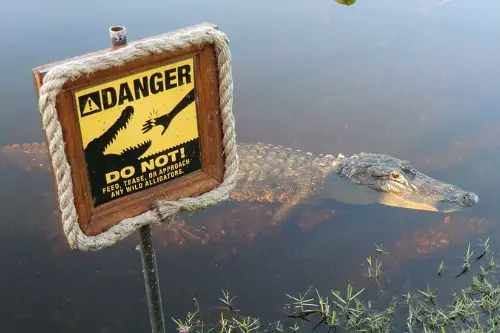
Believe it or not, while feeding wild alligators is illegal across Florida, there are some private properties and controlled environments where it’s allowed. Gator parks and attractions often let you chuck food at these prehistoric beasts, sometimes with just a signed waiver. It’s still wildly dangerous—alligators are known to associate humans with food after repeated feedings. But technically, on private land or under supervision, you’re in the clear.
The logic? These parks argue that it helps educate the public and boost tourism. So if you’re itching to toss marshmallows or chunks of chicken at a reptile with 80 razor-sharp teeth, Florida’s got you covered. Just don’t try this at your neighborhood pond—you’ll get slapped with a fine or worse. And you really, really don’t want to get on a gator’s bad side.
2. Ride your bike without a helmet (if you’re over 16)

In Florida, once you hit your 17th birthday, you’re free to ride a bike helmet-free like it’s 1995, according to the Jurewitz Law Group. Despite being one of the deadliest states for cyclists, there’s no legal requirement for adults to wear any protective gear. It’s all part of Florida’s “personal freedom” culture—do what you want, just be ready to suffer the consequences. Emergency rooms, meet skull fractures.
This law baffles public safety officials, especially since the state ranks so poorly in bicycle safety metrics. It’s also one of the reasons some cities are trying to pass local ordinances to encourage helmets through incentives rather than mandates. But for now, wind in your hair (and bugs in your teeth) is totally legal. Just don’t expect sympathy if you crash.
3. Own a kangaroo

Yes, you read that right—you can legally own a kangaroo in Florida with the proper permit, according to Brandon Girod of the Pensacola News Journal. The state classifies kangaroos as Class III wildlife, meaning they’re not considered particularly dangerous and don’t require special experience to own. You’ll need to register them with the Florida Fish and Wildlife Conservation Commission, but that’s about it. A suburban kangaroo is just one application away.
People actually do this, too—there are folks in Florida walking marsupials on leashes or posting Instagram videos of Joeys hopping around backyards. It’s not recommended by animal welfare groups, but hey, it’s Florida. The state that gave us “Florida Man punches gator” isn’t about to ban bouncy Australian mammals. Just be ready for a few odd looks at the vet.
4. Fire a gun in your backyard (in some residential areas)
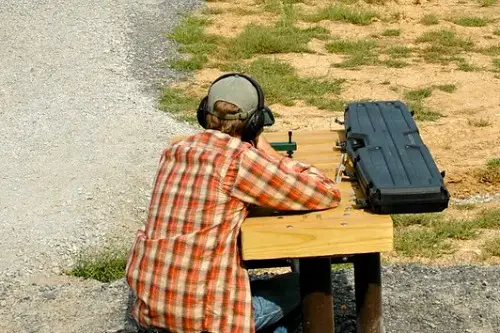
If your house is in an unincorporated area or one without specific ordinances, it may still be totally legal to fire a gun in your backyard in Florida, according to C. A. Bridges of the Tallahassee Democrat. The only statewide restriction is that it can’t be “reckless or negligent”—whatever that means in practice. So technically, someone could be target-shooting two doors down while you’re barbecuing. Welcome to “stand your ground” territory.
This loophole has caused no shortage of complaints, especially from neighbors who don’t love hearing gunfire over brunch. But because of Florida’s strong preemption laws, local governments often can’t override state gun laws. Unless someone gets hurt or there’s property damage, there’s not much recourse. So yeah, maybe invest in noise-canceling headphones.
5. Let your pet monkey ride shotgun

Florida’s exotic pet laws don’t just allow kangaroos—you can also legally own a monkey, depending on the species and licensing. As long as you meet enclosure and permit requirements, you’re allowed to take that little guy out for a spin, according to Steve Montiero of WKMG. There’s no law stopping you from letting your monkey hang out in the passenger seat or even on your lap (though it’s not advised). It’s weird, but perfectly legal.
This isn’t just theoretical either—there have been multiple documented cases of monkeys riding in convertibles or perched on their owner’s shoulder at gas stations. Florida: where the line between zoo and neighborhood gets blurry. Animal rights advocates have long pushed for tighter laws, but change comes slow in the Sunshine State. So yes, your next road trip playlist might feature monkey backup vocals.
6. Park on your front lawn
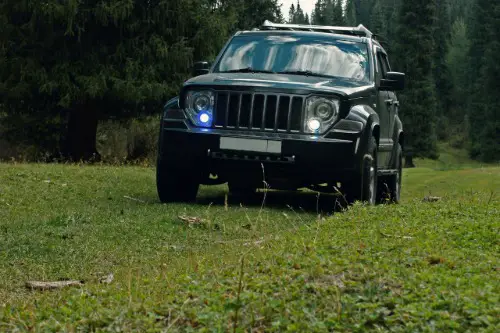
In many Florida towns and counties, there are either no laws or very lax enforcement about parking cars on your own front lawn. So if you want to turn your grass into a car dealership, no one’s really going to stop you. It’s an eyesore, sure—but not an illegal one in plenty of places. That’s freedom, baby.
Some cities have tried to implement ordinances to prevent this, especially in HOA-free zones. But enforcement is patchy, and tickets are rare unless someone complains loudly. Florida’s strong property rights culture makes it hard to crack down. So if you see a lawn covered in F-150s, just know: it’s probably legal.
7. Sell unpasteurized milk (with a loophole)

Raw milk is technically illegal to sell for human consumption in Florida—but here’s the twist: it’s completely legal to sell it as “pet food.” That’s right, you can walk into a farmer’s market and buy raw milk labeled “for animal use only,” and nobody’s really checking what species is drinking it. It’s the kind of legal sidestep that Florida is famous for. So if you’re into risky dairy, the state has your back.
This loophole allows a small but loyal community of raw milk enthusiasts to keep sipping, despite health warnings. Sellers are required to label it appropriately, but let’s be honest—most buyers know what they’re doing. The state mostly looks the other way, provided sellers don’t market it directly for people. It’s unregulated dairy drama, Florida-style.
8. Hunt invasive iguanas
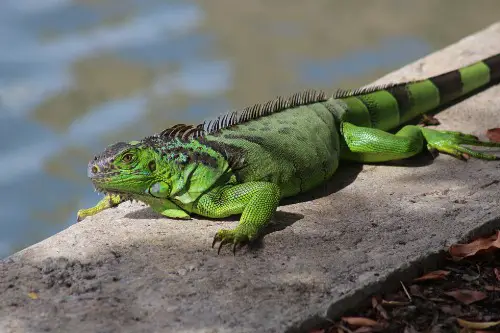
In Florida, green iguanas are considered invasive and harmful to the environment—so the state basically says, “Have at it.” You’re legally allowed to humanely kill them on your own property without a permit. This includes using air rifles, catching them with traps, or even whacking them with a shovel. It’s bizarre, but totally sanctioned.
The reason is that iguanas destroy gardens, foundations, and even sidewalks with their burrowing. They’ve become such a menace that wildlife officials encourage Floridians to take action themselves. Just make sure you kill them humanely—because even pest control comes with rules. And yes, there’s an entire subculture of backyard iguana hunters now.
9. Drink alcohol in public (in some beach towns)

Florida is notoriously inconsistent when it comes to public drinking laws. In cities like Key West and Daytona Beach, it’s completely legal to stroll around with a beer in hand—no brown bag required. Other cities ban it outright, so it really depends on where your flip-flops land. But yes, you can still legally day-drink on certain public sidewalks and beaches.
It’s part of the laid-back, vacation-state vibe, and locals tend to embrace it. That said, you’ll want to double-check local ordinances before cracking open a White Claw in public. Some places will fine you, others might join you. Florida: where legality depends on your zip code and whether Jimmy Buffett is playing nearby.
10. Drive golf carts on public roads (sometimes without a license)

In many Florida towns, you can legally drive a golf cart on certain public roads—even if you don’t have a driver’s license. As long as the road has a speed limit of 35 mph or lower, and you’re over 14, you’re good to go. Some retirement communities and islands are almost entirely golf-cart-based. It’s legal and very, very Florida.
This setup isn’t just for seniors—teens and tourists take full advantage too. Golf carts have become so common that some towns have designated lanes or special parking just for them. Sure, it’s a bit chaotic, but that’s part of the charm. Just watch out for the occasional rogue raccoon in the passenger seat.
11. Keep a gun in your car at work (even if your boss hates it)

Florida’s “Bring Your Gun to Work” law allows employees to keep legally owned firearms locked in their cars, even if their employer has a no-guns policy. The only requirement is that the firearm must be kept securely in a locked vehicle. This law overrides most workplace rules, causing no small amount of HR headaches. But it’s absolutely legal.
The law was designed to support Second Amendment rights and has been on the books since 2008. Business owners can’t even ask if you’ve got a gun in your glovebox. It’s controversial, but firmly entrenched in Florida’s legislative DNA. So yes, your coworker might be packing during that awkward team-building retreat.
12. Get married without a blood test or waiting period (if you’re not a Floridian)

Florida used to require a blood test and a waiting period for all marriages, but those days are gone—especially if you’re from out of state. If you’re a non-resident, there’s no waiting period at all; you can get your marriage license and tie the knot the same day. And no one’s poking you with a needle to test for diseases. Romantic, right?
It’s part of what makes Florida a hotspot for impulsive beach weddings and courthouse elopements. Residents do have a 3-day waiting period unless they take a premarital course, but tourists get the express lane. It’s like Vegas, but with more humidity and flamingos. So yes, a spur-of-the-moment wedding in flip-flops is 100% legal.
13. Own as many cats as you want

While some cities have pet limits, most of Florida has no cap on how many cats you can legally keep. That means you could have 2 cats, 12 cats, or your own personal feline army—totally legal. There are rules about humane treatment and sanitation, but quantity? Not really a concern. Your HOA might hate you, but the law won’t.
Animal welfare agencies often deal with “hoarding” cases, but unless conditions are truly unsanitary or abusive, the state stays hands-off. Florida’s focus tends to be on whether animals are suffering, not how many you’ve got. So if your dream is to become the next viral cat person, Florida might just be your purring paradise. Just stock up on litter.
14. Go topless on certain beaches (for all genders)
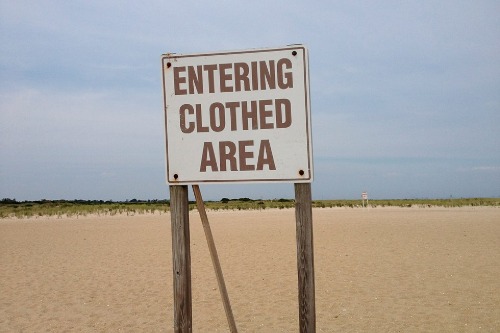
It’s not legal everywhere, but several beaches in Florida allow topless sunbathing for both men and women. Haulover Beach in Miami is the most famous example, drawing locals and tourists alike who want to catch some rays without tan lines. As long as you’re in a designated area, it’s totally allowed. And no, you won’t get arrested for it.
Florida’s public nudity laws are strict in most places, but a handful of beaches have carved out exceptions. These spots often come with signs, clear rules, and even lifeguards familiar with the scene. So if your sunscreen only covers half your body, just head to the right stretch of sand. It’s legal, liberating, and very on-brand for the state.
15. Skip car inspections entirely

Unlike many states, Florida doesn’t require annual vehicle safety inspections or emissions testing. Once your car is registered, you’re good to go—rattling muffler, bald tires and all. This has raised eyebrows among safety advocates, but for now, it’s the law. Florida: where your car can legally be a deathtrap on wheels.
The lack of inspections is a point of pride for those who hate bureaucracy. But it also means some pretty sketchy vehicles share the road with you. You’ll see it all: duct-taped bumpers, cracked windshields, and smoke-belching exhausts. It’s legal, it’s real, and it’s rolling down I-95.
16. Have a python as a pet (if it’s not one of the banned ones)

Some large constrictor snakes like Burmese pythons are banned in Florida due to environmental damage, but others—like ball pythons—are totally legal to own. You don’t even need a special permit for many species. As long as it’s not one of the state’s restricted reptiles, you can keep your giant noodle at home. Just don’t let it escape.
The reason some snakes are banned and others aren’t? It’s all about their invasiveness and ability to survive in the wild. Ball pythons are popular because they stay relatively small and docile, but others can grow to 20 feet and eat deer. If your snake doesn’t threaten the ecosystem, Florida gives you a thumbs up.
17. Legally collect rainwater (unlike in some states)

While a few states have restrictions on harvesting rainwater, Florida says, “Go for it.” Homeowners are allowed—and even encouraged—to collect rainwater in barrels and cisterns. Some municipalities even offer rebates for installing rain catchment systems. So yes, it’s legal to hoard Mother Nature’s free water.
This legality surprises people who’ve heard of bans in other parts of the U.S., like Colorado (which has since relaxed its stance). But in water-hungry Florida, conservation efforts are applauded. Just be sure your setup follows local plumbing codes if you’re integrating it into your irrigation. Otherwise, your rain barrel is fair game.


